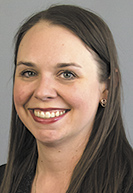Subscriber Benefit
As a subscriber you can listen to articles at work, in the car, or while you work out. Subscribe NowFor the first time, three new Marion County judges have been appointed through merit-based selection.
Charnette Garner, Jennifer Harrison and Mark Jones were chosen by Gov. Eric Holcomb from among 40 applicants to replace retiring Indianapolis judges Becky Pierson-Treacy, Michael Keele and Thomas Carroll, respectively. Holcomb announced his selections after considering nine finalists recommended by the 14-member Marion County Judicial Selection Committee.
Keele praised the merit selection process as having produced three quality candidates to become the county’s next judges, though he also said the former slating system, despite its flaws, yielded excellent judicial officers. Keele plans to retire at the end of this year and to serve, as a senior judge after his retirement.
Pierson-Treacy and Carroll did not respond to requests for comment about their retirement and successors.
Garner, Harrison and Jones won’t necessarily inherit their predecessors’ dockets. Instead, sitting judges will have the freedom to transfer to new courts, if desired, leaving the newest jurists to preside over the remaining dockets.
Indiana Lawyer recently spoke with the three new judges to find out how they’re preparing for their next career moves.
 Garner
GarnerCharnette Garner
Marion County Prosecutor’s Office Chief Counsel Charnette Garner intended to become a criminal defense lawyer, but life took her down a different path. Aside from a six-month stint in the U.S. Attorney’s Office in Indianapolis, Garner’s Hoosier career has been based in the MCPO, where she’s prosecuted sex crimes and major felonies and has been a supervisor. Now, she’s preparing to join the bench.
What qualities have you liked in the judges that you’ve practiced before?
Every courtroom is different, the process is different, how cases are called is different, the perception of even how people feel they are treated in a courtroom is different. I would hope I have a courtroom where … they would be glad to see their cases landed in my courtroom.
How are you preparing to become a judge?
A lot of current judges have reached out to me and are willing to sit down and answer my questions, so that’s probably a first step. Until you know where your assignment is, do you really know what questions you need to ask? I’m sure I’ll go over and sit in that courtroom (where I’m assigned) and just watch and sit with the judge that’s in there now.
Is there anything about becoming a judge that scares you or worries you?
Obviously, if I am selected to go into a civil courtroom, that’s a steeper learning curve. But I know now that I don’t know all the answers, so there will be a learning curve no matter where I go.
Do you think you’ll miss being on the other side of the bench?
I’m sure, though I really haven’t been trying cases since I’ve been in the role of chief counsel. But I think, especially when you’re a judge in a criminal case, how do you not object? Don’t you want to be like, “Objection!”
 Harrison
HarrisonJennifer Harrison
Lewis and Wilkins associate Jennifer Harrison described her interview with the Judicial Selection Committee as “the fastest 20 minutes of her life.” Then, on the same day as her interview with Holcomb’s office, Harrison practiced in Judge Keele’s court, which she took as a good sign that she might be selected to succeed him after his retirement. With that feeling now fact, Harrison is preparing to take her varied legal experience to the bench.
Why did you want to become a judge?
That started about two years into being a public defender and thinking about how having great judges on the bench can reduce recidivism, especially if you have judges who are open to creative options for sentencing.
What kind of questions were you asked during the interview process?
They asked about how you would handle cases if they got media attention, and I thought that was a good one for them to have answers on. That’s not something you typically think about. I was also asked how my background as a public defender reflects the diversity of Marion County. I’ve interacted with different segments of the population and saw a lot of different struggles that community members had.
What do you hope to bring to the bench?
One of my big beliefs for civil and criminal litigation is equal access to justice, and what that means to me is that everybody in the courtroom has been heard. Additionally, I hope that I can impart collegiality. Also, patience.
How will your career background influence your work as a judge?
I’ve worked for a plaintiff’s firm and a civil defense firm, and for a prosecutor’s office and a public defender’s office, so I’ve seen all sides of the process. And with my public defender background, you go and do so many trials that the rules of evidence are very engrained in my brain. And, at Lewis and Wilkins, I do a lot of our writing, so I know a lot about the Civil Rules of Procedure.
 Jones
JonesMagistrate Judge Mark Jones
The third time was the charm for Marion Circuit Magistrate Judge Mark Jones, who has tried twice before to secure a judgeship. But more important than sitting on the bench, Jones — who has worked in a prosecutor’s office, as a public defender, in the Attorney General’s Office and in real estate, among other legal jobs — said his top priority is being a husband and father to his four children. Here’s a look at his judicial qualities.
You’re one of three Marion County judges to be appointed through merit-based selection for the first time. What was that process like?
I’ve been through the process before, but not with a committee. I tried to get an appointment from then-Gov. (Mitch) Daniels back in ’04 … and I was fortunate enough to get an interview with the governor. Then I went through the slating process in 2014, and I lost in slating by 23 votes. So this process is much different. … It was exhilarating and anxiety-producing.
What makes you a good magistrate now, and what will make you a good judge?
It’s my experience and my demeanor on the bench. I think I’m patient, I think I listen well and I always strive to give a fair result.
Are you concerned about possibly having to adjust to a new docket?
I’m not. When I came here (to Circuit Court), I had done mostly criminal work … so I had a pretty significant learning curve. But for me, it ended up being fun.
Is there anything else that will be different?
With the discussions about moving to the justice center, that’s a big deal. There’s been all this discussion about the silos, so at least from my point of view, that’s an unknown and that’s exciting and it makes me wonder where I’ll end up landing.•
Please enable JavaScript to view this content.
